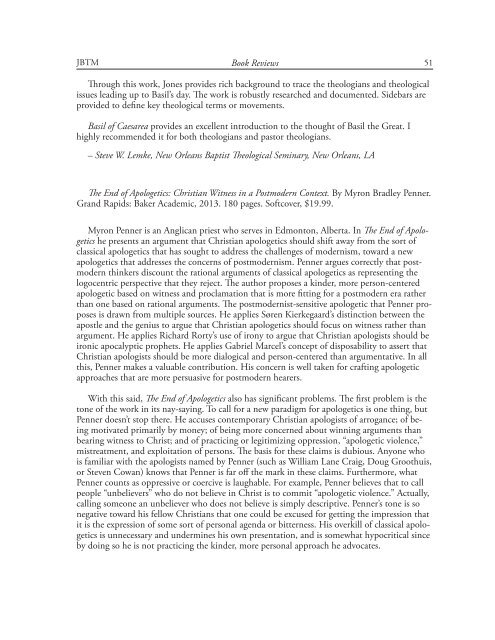JBTM Book Reviews51Through this work, Jones provides rich background to trace the theologians and theologicalissues leading up to B<strong>as</strong>il’s day. The work is robustly researched and documented. Sidebars areprovided to define key theological terms or movements.B<strong>as</strong>il of Caesarea provides an excellent introduction to the thought of B<strong>as</strong>il the Great. Ihighly recommended it for both theologians and p<strong>as</strong>tor theologians.– Steve W. Lemke, New Orleans Baptist Theological Seminary, New Orleans, LAThe End of Apologetics: Christian Witness in a Postmodern Context. By Myron Bradley Penner.Grand Rapids: Baker Academic, 2013. 180 pages. Softcover, $19.99.Myron Penner is an Anglican priest who serves in Edmonton, Alberta. In The End of Apologeticshe presents an argument that Christian apologetics should shift away from the sort ofcl<strong>as</strong>sical apologetics that h<strong>as</strong> sought to address the challenges of modernism, toward a newapologetics that addresses the concerns of postmodernism. Penner argues correctly that postmodernthinkers discount the rational arguments of cl<strong>as</strong>sical apologetics <strong>as</strong> representing thelogocentric perspective that they reject. The author proposes a kinder, more person-centeredapologetic b<strong>as</strong>ed on witness and proclamation that is more fitting for a postmodern era ratherthan one b<strong>as</strong>ed on rational arguments. The postmodernist-sensitive apologetic that Penner proposesis drawn from multiple sources. He applies Søren Kierkegaard’s distinction between theapostle and the genius to argue that Christian apologetics should focus on witness rather thanargument. He applies Richard Rorty’s use of irony to argue that Christian apologists should beironic apocalyptic prophets. He applies Gabriel Marcel’s concept of disposability to <strong>as</strong>sert thatChristian apologists should be more dialogical and person-centered than argumentative. In allthis, Penner makes a valuable contribution. His concern is well taken for crafting apologeticapproaches that are more persu<strong>as</strong>ive for postmodern hearers.With this said, The End of Apologetics also h<strong>as</strong> significant problems. The first problem is thetone of the work in its nay-saying. To call for a new paradigm for apologetics is one thing, butPenner doesn’t stop there. He accuses contemporary Christian apologists of arrogance; of beingmotivated primarily by money; of being more concerned about winning arguments thanbearing witness to Christ; and of practicing or legitimizing oppression, “apologetic violence,”mistreatment, and exploitation of persons. The b<strong>as</strong>is for these claims is dubious. Anyone whois familiar with the apologists named by Penner (such <strong>as</strong> William Lane Craig, Doug Groothuis,or Steven Cowan) knows that Penner is far off the mark in these claims. Furthermore, whatPenner counts <strong>as</strong> oppressive or coercive is laughable. For example, Penner believes that to callpeople “unbelievers” who do not believe in Christ is to commit “apologetic violence.” Actually,calling someone an unbeliever who does not believe is simply descriptive. Penner’s tone is sonegative toward his fellow Christians that one could be excused for getting the impression thatit is the expression of some sort of personal agenda or bitterness. His overkill of cl<strong>as</strong>sical apologeticsis unnecessary and undermines his own presentation, and is somewhat hypocritical sinceby doing so he is not practicing the kinder, more personal approach he advocates.
JBTM Book Reviews52A second problem with Penner’s proposal is that he seems to be calling for the abolitionof cl<strong>as</strong>sical apologetics rather than supplementing it with a new paradigm. The subtitle of thebook’s introduction, “Against Apologetics,” is revealing. Penner appears to equivocate on therationale for forcing the abolition of cl<strong>as</strong>sical apologetics. He argues on successive pages that“modernity is, for better or worse, our situation, and we may never fully leave it behind us”(13), and yet proclaims on the next page (echoing the subtitle of the book) that postmodernismshould be the “starting point” for apologetics in our postmodern setting (14). First ofall, Penner glosses over the fact that apologetics did not begin with modernism, but in theearly days of the church during which the premodern worldview w<strong>as</strong> dominant. Early Christianfathers such <strong>as</strong> Origen, Tertullian, and Justin Martyr wrote defenses of their Christianfaith against the predominant rationalistic Greek worldview, so apologetics w<strong>as</strong> not originallydesigned to address or express modernism. However, in our contemporary setting, if many personsremain within a modernist mindset, or even some persons, why would it not be fruitfulto utilize cl<strong>as</strong>sical apologetics to minister to the needs of these persons, while also developing anew paradigm for apologetics to minister to persons with a postmodern mindset? For example,our Greer-Heard Point-Counterpoint Forum l<strong>as</strong>t year, featuring apologist William Lane Craigand atheistic physicist Sean Carroll, had over eight hundred in attendance and over ten thousandwatching via a live webstream. If this is meeting so many people’s needs and interests, whyis it so evil? Similarly, I recently heard testimonies of how a number of people were blessed andtheir faith strengthened by the Re<strong>as</strong>ons to Believe and BioLogos apologetics ministries. As long<strong>as</strong> they are helping people strengthen their faith, why is it a problem? In fact, since only a smallpercentage of the world’s population are actually adherents of postmodernism, it seems like <strong>as</strong>trange and self-defeating method to utilize just an apologetic method that is tailored for postmodernists,and it betrays a serious Western bi<strong>as</strong> in Penner’s thought. Furthermore, Penner’sclaims appear to be self-referentially incoherent in that, while calling for the demise of modernisticrational arguments, he nonetheless makes modernistic rationalistic arguments throughoutthe volume. His arguments are far from the sort of person-centered apologetic method that headvocates.Another problematic <strong>as</strong>pect of The End of Apologetics arises from some <strong>as</strong>pects of Penner’sproposal for a new paradigm for apologetics. Although it is somewhat slippery to <strong>as</strong>sert withany confidence what postmodernists actually “mean,” there are points at which Penner may notfully represent some <strong>as</strong>pects of the thought of some postmodernists. For example, he utilizesRorty’s notion of ironic poets in Contingency, Irony, and Solidarity to argue that Christiansshould be ironic prophets. Penner does not mention that in the same volume, Rorty appliesthis principle by suggesting that one should deal with private fant<strong>as</strong>ies such <strong>as</strong> reading the bookLolita rather than acting on those fant<strong>as</strong>ies. The impracticality of this idea is made manifest bythe fact that even Rorty himself would believe that giving a copy of Lolita to a clinically diagnosedpedophile ex-convict who lived next door and began befriending Rorty’s young daughteris a good solution. The problem with irony <strong>as</strong> a technique is that it is unconvincing to manypeople. Kierkegaard also used irony early in his writing career, but later despaired of its effectivenessand moved toward more direct means of communication. Likewise, Penner makesmuch of Kierkegaard’s distinction between the witnessing apostle and the rationalist genius.However, Jean-Francois Lyotard’s cl<strong>as</strong>sic definition of postmodernism in The Postmodern Conditionis “incredulity towards metanarratives.” So, while one would affirm the crucial role ofprophetic proclamation in Christian witness, what re<strong>as</strong>on is there to believe that postmodernistswould be any more open to metanarrative-saturated prophetic witness than to rationalistic



